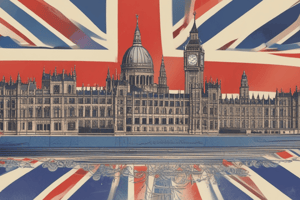Podcast
Questions and Answers
What is the principle of sovereignty of Parliament, and what does it entail?
What is the principle of sovereignty of Parliament, and what does it entail?
The principle of sovereignty of Parliament means that Parliament has the power to make or unmake any law, with no higher authority to limit its powers.
What is the significance of the Parliament Acts of 1911 and 1949 in relation to the role of Parliament in constitutional law?
What is the significance of the Parliament Acts of 1911 and 1949 in relation to the role of Parliament in constitutional law?
They established the supremacy of Parliament, allowing it to override the House of Lords.
What is the system of government in the UK, and how does it relate to the concept of separation of powers?
What is the system of government in the UK, and how does it relate to the concept of separation of powers?
The UK has a system of government based on the separation of powers, where Parliament, the executive, and the judiciary are separate and independent, with each branch having distinct roles and responsibilities.
What is meant by the term 'unwritten constitution' in the context of the UK's constitutional law?
What is meant by the term 'unwritten constitution' in the context of the UK's constitutional law?
How do constitutional conventions influence the behavior of Parliament and the government?
How do constitutional conventions influence the behavior of Parliament and the government?
How did the Human Rights Act 1998 limit Parliament's power?
How did the Human Rights Act 1998 limit Parliament's power?
Prior to Brexit, how did European Union law impact Parliament's power?
Prior to Brexit, how did European Union law impact Parliament's power?
How has devolution affected Parliament's power?
How has devolution affected Parliament's power?
Study Notes
Constitutional Law and Parliament
The Role of Parliament in Constitutional Law
- Parliament is the supreme law-making body in the UK, with the power to create, amend, or repeal laws.
- The Parliament Acts of 1911 and 1949 established the supremacy of Parliament, allowing it to override the House of Lords.
Key Principles of Constitutional Law Relating to Parliament
- Sovereignty of Parliament: Parliament has the power to make or unmake any law, with no higher authority to limit its powers.
- Parliamentary Supremacy: Parliament is the highest authority in the UK, with the power to override the judiciary and the executive.
- Separation of Powers: Parliament, the executive, and the judiciary are separate and independent, with each branch having distinct roles and responsibilities.
The Relationship Between Parliament and the Constitution
- Unwritten Constitution: The UK does not have a single, codified constitution; instead, its constitution is based on a collection of laws, conventions, and traditions.
- Constitutional Conventions: Unwritten rules and norms that guide the behavior of Parliament and the government, such as the requirement for the government to maintain the confidence of the House of Commons.
Limitations on Parliament's Power
- Human Rights Act 1998: Protects individual rights and freedoms, limiting Parliament's ability to pass laws that infringe on these rights.
- European Union Law: Prior to Brexit, EU law took precedence over UK law, limiting Parliament's power in certain areas.
- Devolution: The transfer of power to Scotland, Wales, and Northern Ireland has limited Parliament's authority in certain areas.
Constitutional Law and Parliament
The Role of Parliament
- Parliament is the supreme law-making body in the UK, with the power to create, amend, or repeal laws.
- The Parliament Acts of 1911 and 1949 established the supremacy of Parliament, allowing it to override the House of Lords.
Key Principles of Constitutional Law
Sovereignty of Parliament
- Parliament has the power to make or unmake any law, with no higher authority to limit its powers.
- This means Parliament can pass, amend, or repeal laws without needing approval from a higher authority.
Parliamentary Supremacy
- Parliament is the highest authority in the UK, with the power to override the judiciary and the executive.
- This means Parliament's decisions are final and cannot be overruled by the courts or the government.
Separation of Powers
- Parliament, the executive, and the judiciary are separate and independent, with each branch having distinct roles and responsibilities.
- This means each branch has its own powers and functions, and no one branch can dominate the others.
The Relationship Between Parliament and the Constitution
Unwritten Constitution
- The UK does not have a single, codified constitution; instead, its constitution is based on a collection of laws, conventions, and traditions.
- This means the UK's constitution is not written in a single document, but is rather made up of various laws and customs.
Constitutional Conventions
- Unwritten rules and norms that guide the behavior of Parliament and the government.
- Examples include the requirement for the government to maintain the confidence of the House of Commons.
Limitations on Parliament's Power
Human Rights Act 1998
- Protects individual rights and freedoms, limiting Parliament's ability to pass laws that infringe on these rights.
- This means Parliament must ensure that laws passed do not violate human rights.
European Union Law (pre-Brexit)
- EU law took precedence over UK law, limiting Parliament's power in certain areas.
- This means that before Brexit, EU laws had priority over UK laws in certain areas.
Devolution
- The transfer of power to Scotland, Wales, and Northern Ireland has limited Parliament's authority in certain areas.
- This means that certain decisions are now made by the devolved governments, rather than by Parliament.
Studying That Suits You
Use AI to generate personalized quizzes and flashcards to suit your learning preferences.
Description
This quiz covers the role of Parliament in the UK's constitutional law, including its power to create and amend laws, and key principles such as sovereignty of Parliament.




